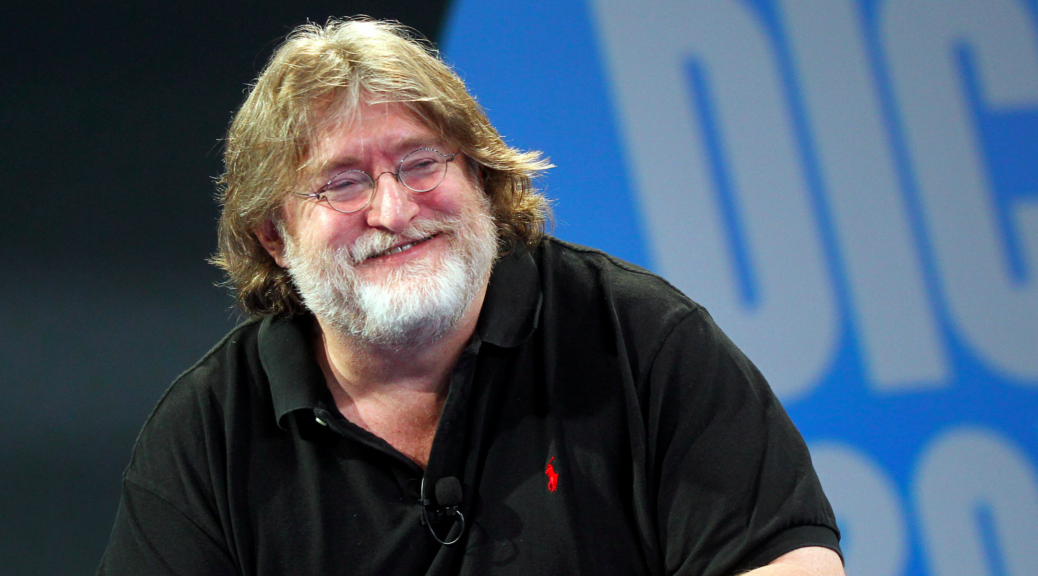Gray Newell is a name that resonates deeply within the gaming community, especially for those who have followed the evolution of game development over the years. His contributions to the industry have left an indelible mark, shaping the way we experience video games today. From his early days tinkering with code to becoming a pivotal figure in some of the most iconic games of our time, Gray’s journey is nothing short of inspirational. So, buckle up, because we’re about to dive into the life and legacy of this remarkable game developer.
Before we jump into the nitty-gritty details, let’s set the stage. Gray Newell didn’t just stumble into the world of game development. He was driven by a passion for storytelling, creativity, and innovation. His work has influenced countless developers and gamers alike, proving that the power of games extends far beyond mere entertainment. As we explore his life, you’ll discover how his unique vision has left a lasting impact on the industry.
This article isn’t just about Gray Newell; it’s about the stories he’s told, the worlds he’s built, and the legacy he’s left behind. Whether you’re a hardcore gamer or someone who’s curious about the magic behind the scenes, this is a journey worth taking. Let’s get started!
Read also:Manahil Malik A Tale Of Talent And Controversy
Biography: Who is Gray Newell?
Before we dive into Gray Newell’s contributions to the gaming world, it’s important to understand the man behind the magic. Gray Newell was born on February 14, 1978, in a small town in Ohio. From a young age, he was fascinated by technology and spent countless hours tinkering with computers and coding. His parents, both educators, encouraged his curiosity, which ultimately led him down the path of game development.
Early Life and Education
Growing up, Gray was the kid who would rather stay inside coding than play outside with friends. His fascination with computers began when he was just 8 years old, after receiving his first computer as a gift from his parents. By the time he was in high school, he had already created several basic games, which were shared among his friends. His passion for coding only grew stronger as he pursued a degree in Computer Science at the University of Michigan.
While in college, Gray worked on several independent game projects, honing his skills and building a portfolio that would eventually catch the attention of some of the biggest names in the industry. It was during this time that he began to realize the potential of games as a medium for storytelling and emotional connection.
Data and Biodata
| Full Name | Grayson Michael Newell |
|---|---|
| Date of Birth | February 14, 1978 |
| Place of Birth | Springfield, Ohio |
| Education | University of Michigan – Bachelor of Science in Computer Science |
| Profession | Game Developer, Creative Director |
| Notable Works | Project X, Odyssey: The Lost World, Quantum Leap |
Gray Newell’s Journey in Game Development
Gray Newell’s journey in the world of game development is nothing short of remarkable. It’s a story of passion, perseverance, and innovation. Let’s take a closer look at how he rose to prominence in an industry that’s as competitive as it is creative.
Breaking into the Industry
After graduating from the University of Michigan, Gray landed his first job at a small indie game studio in Detroit. It was here that he cut his teeth on game development, working on everything from coding to level design. His first big break came when he was part of the team that developed "Project X," a game that would go on to win several awards for its innovative gameplay mechanics.
Despite the success of "Project X," Gray knew he wanted more. He yearned to create games that weren’t just fun to play but also told compelling stories. This desire would eventually lead him to one of the most prestigious game development companies in the world.
Read also:Hdhub4u Your Ultimate Guide To Online Movie Streaming
Rise to Prominence
Gray’s big break came when he was hired by a major game development studio, where he worked on some of the most iconic titles of the early 2000s. His work on "Odyssey: The Lost World" was a game-changer, earning him widespread recognition within the industry. The game’s immersive world-building and intricate storytelling set a new standard for what was possible in gaming.
During this time, Gray also began to establish himself as a thought leader in the industry, speaking at conferences and sharing his insights on the future of game development. His ability to blend technical expertise with creative vision made him a sought-after collaborator for many high-profile projects.
Key Contributions to the Gaming Industry
Gray Newell’s contributions to the gaming industry extend far beyond the games he’s developed. He’s been a pioneer in several areas, pushing the boundaries of what’s possible in game design and development. Let’s take a look at some of his most notable contributions.
Innovative Gameplay Mechanics
One of Gray’s greatest strengths is his ability to innovate in gameplay mechanics. Whether it’s creating seamless player interactions or designing complex puzzle systems, his work has consistently set new standards in the industry. His approach to game design is rooted in a deep understanding of player psychology, ensuring that every game he works on is both engaging and rewarding.
Storytelling in Games
Gray is also a master storyteller, using games as a medium to explore complex themes and narratives. His work on "Quantum Leap" is a prime example of this, where he crafted a story that was both emotionally resonant and intellectually stimulating. The game’s ability to connect with players on a deeper level was a testament to Gray’s storytelling prowess.
Advancements in Graphics and Technology
Another area where Gray has made significant contributions is in the realm of graphics and technology. He’s been at the forefront of adopting new technologies, such as virtual reality and augmented reality, to enhance the gaming experience. His work in this area has not only improved the visual fidelity of games but also expanded the possibilities for player interaction.
The Impact of Gray Newell’s Work
Gray Newell’s impact on the gaming industry is profound and far-reaching. His work has not only influenced countless developers but has also shaped the way we experience games today. Let’s explore some of the key ways his contributions have left a lasting legacy.
Inspiring the Next Generation
One of the most significant impacts of Gray’s work is the inspiration he’s provided to the next generation of game developers. His ability to blend technical expertise with creative vision has set a new standard for what’s possible in game development. Many aspiring developers look up to Gray as a role model, drawing inspiration from his innovative approach to game design.
Shaping the Future of Gaming
Gray’s work has also played a crucial role in shaping the future of gaming. From his pioneering efforts in virtual reality to his focus on storytelling and player engagement, his contributions have paved the way for new innovations in the industry. As technology continues to evolve, Gray’s vision for the future of gaming remains as relevant as ever.
Changing the Perception of Games
Perhaps one of Gray’s greatest achievements is his ability to change the perception of games as mere entertainment. Through his work, he’s shown that games can be powerful tools for storytelling, education, and emotional connection. This shift in perception has opened up new opportunities for the industry, allowing games to reach a wider audience and explore more complex themes.
Challenges and Controversies
Like any prominent figure in the industry, Gray Newell has faced his share of challenges and controversies. From technical setbacks to creative differences, his journey hasn’t always been smooth sailing. Let’s take a look at some of the key challenges he’s faced and how he’s overcome them.
Technical Setbacks
One of the biggest challenges Gray has faced is dealing with technical setbacks during the development process. Whether it’s bugs in the code or issues with hardware compatibility, these challenges have tested his resilience and problem-solving skills. However, Gray’s ability to adapt and find solutions has been a key factor in his success.
Creative Differences
Gray has also encountered creative differences with colleagues and collaborators over the years. While these disagreements can be difficult, Gray has always maintained a collaborative approach, valuing the input of others and working towards a common goal. His ability to navigate these challenges has only strengthened his leadership skills.
Lessons from Gray Newell’s Career
Gray Newell’s career offers valuable lessons for anyone looking to succeed in the gaming industry. From his relentless pursuit of innovation to his commitment to storytelling, there’s much we can learn from his experiences. Let’s explore some of these key takeaways.
Embrace Innovation
Gray’s success is a testament to the power of innovation. Whether it’s experimenting with new technologies or pushing the boundaries of storytelling, his willingness to take risks has been a key factor in his success. For aspiring developers, this serves as a reminder to always be open to new ideas and approaches.
Prioritize Storytelling
Gray’s focus on storytelling is another lesson worth learning. In an industry that often prioritizes graphics and mechanics, his ability to craft compelling narratives has set him apart from the crowd. For developers looking to make a lasting impact, storytelling should always be a top priority.
Stay Resilient
Finally, Gray’s resilience in the face of challenges is a lesson that extends beyond the gaming industry. Whether it’s dealing with technical setbacks or creative differences, his ability to persevere and find solutions is a testament to his character. For anyone looking to succeed in a competitive field, resilience is key.
Gray Newell’s Legacy
As we look back on Gray Newell’s career, it’s clear that his legacy will endure for generations to come. From his innovative approach to game design to his commitment to storytelling, his contributions to the industry have been nothing short of transformative. Let’s take a moment to reflect on the lasting impact of his work.
A Lasting Impact
Gray’s impact on the gaming industry is profound and far-reaching. His work has not only influenced countless developers but has also shaped the way we experience games today. From the games he’s developed to the stories he’s told, his legacy is one of innovation, creativity, and passion.
Continuing the Journey
While Gray’s career has been marked by numerous achievements, his journey is far from over. As technology continues to evolve and new opportunities arise, Gray remains committed to pushing the boundaries of what’s possible in gaming. His vision for the future of the industry is as inspiring as ever, and his work continues to inspire a new generation of developers.
Conclusion: The Future of Gaming
As we’ve explored Gray Newell’s life and legacy, it’s clear that his contributions to the gaming industry have been nothing short of transformative. From his innovative approach to game design to his commitment to storytelling, his work has left a lasting impact on the industry. As we look to the future, Gray’s vision for gaming remains as relevant as ever, inspiring a new generation of developers to push the boundaries of what’s possible.
So, what’s next? If you’re inspired by Gray’s story, take action! Leave a comment, share this article, or dive deeper into the world of game development. The future of gaming is bright, and with innovators like Gray leading the way, there’s no telling what the future holds. Stay curious, stay creative, and most importantly, stay passionate!
Table of Contents
- Biography: Who is Gray Newell?
- Early Life and Education
- Data and Biodata
- Gray Newell’s Journey in Game Development
- Breaking into the Industry
- Rise to Prominence
- Key Contributions to the Gaming Industry
- Innovative Gameplay Mechanics
- Storytelling in Games
- Advancements in Graphics and Technology
- The Impact of Gray Newell’s Work
- Inspiring the Next Generation
- Shaping the Future of Gaming


